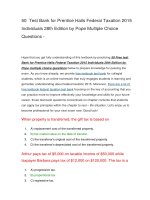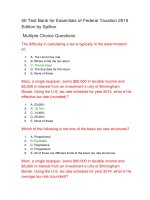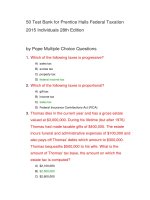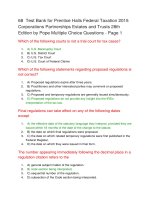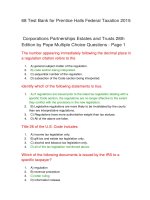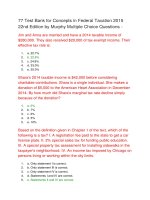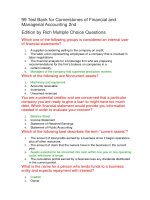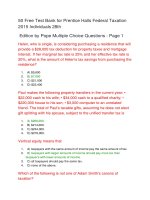99 test bank for prentice halls federal taxation 2013 individuals 26th
Bạn đang xem bản rút gọn của tài liệu. Xem và tải ngay bản đầy đủ của tài liệu tại đây (132.11 KB, 28 trang )
99 Test Bank for Prentice Halls Federal Taxation 2013
Individuals 26th
Mutiple Choice Questions
In 2012, an estate is not taxable unless the sum of the taxable estate and
taxable gifts made after 1976 exceeds
1.
A) $1,500,000.
2.
B) $2,000,000.
3.
C) $3,500,000.
4.
D) $5,000,000.
Which of the following taxes is progressive?
1.
A) sales tax
2.
B) excise tax
3.
C) property tax
4.
D) income tax
Alan files his 2011 tax return on April 1, 2012. His return contains no
misstatements or omissions of income. The statute of limitations for changes
to the return expires
1.
A) April 1, 2014.
2.
B) April 15, 2015.
3.
C) April 15, 2016.
4.
D) The statute of limitations never expires.
Martha is self-employed in 2012. Her business profits are $140,000. What is
her self-employment tax?
1.
A) $17,700
2.
B) $15,510
3.
C) $21,420
4.
D) None of the above.
Horizontal equity means that
1.
A) taxpayers with the same amount of income pay the same amount of tax.
2.
B) taxpayers with larger amounts of income should pay more tax than taxpayer's with
lower amounts of income.
3.
C) all taxpayers should pay the same tax.
4.
D) none of the above.
Shaquille buys new cars for five of his friends. Each car cost $70,000. What is
the amount of Shaquille's taxable gifts?
1.
A) $0
2.
B) $285,000
3.
C) $337,000
4.
D) $350,000
AB Partnership earns $500,000 in the current year. Partners A and B are equal
partners who do not receive any distributions during the year. How much
income does partner A report from the partnership?
1.
A) $0
2.
B) $250,000
3.
C) $500,000
4.
D) None of the above.
The IRS must pay interest on
1.
A) all tax refunds.
2.
B) tax refunds paid later than 30 days after the due date.
3.
C) tax refunds paid later than 45 days after the due date.
4.
D) The IRS never pays interest on tax refunds.
What is an important aspect of a limited liability partnership?
1.
A) It is the same as a limited partnership where the general partner has unlimited
liability.
2.
B) A partner has unlimited liability arising from his or her own acts of negligence or
misconduct or similar acts of any person under his or her direct supervision, but does
not have unlimited liability in other matters.
3.
C) All partners have limited liability regarding all partnership activities.
4.
D) All partners have unlimited liability.
Which of the following taxes is regressive?
1.
A) Federal Insurance Contributions Act (FICA)
2.
B) excise tax
3.
C) property tax
4.
D) gift tax
Which of the following is not a social objective of the tax law?
1.
A) prohibition of a deduction for illegal bribes, fines and penalties
2.
B) a deduction for charitable contributions
3.
C) an exclusion for interest earned by large businesses
4.
D) creation of tax-favored pension plans
Kate files her tax return 36 days after the due date. When she files the return,
she sends a check for $2,000 which is the balance of the tax owed by her.
Kate's penalty for failure to file a return will be
1.
A) 0.5% per month (or factor thereof) up to a maximum of 25%.
2.
B) 5% per month (or factor thereof) up to a maximum of 25%.
3.
C) 20% per month (or factor thereof).
4.
D) none of the above.
A tax bill introduced in the House of Representatives is then
1.
A) referred to the House Ways and Means Committee for hearings and approval.
2.
B) referred to the full House for hearings.
3.
C) forwarded to the Senate Finance Committee for consideration.
4.
D) voted upon by the full House.
The term "tax law" includes
1.
A) Internal Revenue Code.
2.
B) Treasury Regulations.
3.
C) judicial decisions.
4.
D) all of the above.
When new tax legislation is being considered by Congress,
1.
A) the tax bill will usually originate in the Senate.
2.
B) different versions of the House and Senate bills are reconciled by the Speaker of the
House and the President of the Senate.
3.
C) different versions of the House and Senate bills are reconciled by a Joint
Conference Committee.
4.
D) after the President of the U.S. approves a tax bill, the Joint Conference Committee
must then vote on passage of the bill.
Which of the following steps, related to a tax bill, occurs first?
1.
A) signature or veto by the President of the United States
2.
B) consideration by the Senate
3.
C) consideration by the House Ways and Means Committee
4.
D) consideration by the Joint Conference Committee
When property is transferred, the gift tax is based on
1.
A) replacement cost of the transferred property.
2.
B) fair market value on the date of transfer.
3.
C) the transferor's original cost of the transferred property.
4.
D) the transferor's depreciated cost of the transferred property.
Rocky and Charlie form RC Partnership as equal partners. Rocky contributes
$100,000 into RC while Charlie contributes real estate with a fair market value
of $100,000. During the current year, RC earned net income of $600,000. The
partnership distributes $200,000 to each partner. The amount that Rocky
should report on his individual tax return is
1.
A) $0.
2.
B) $100,000.
3.
C) $200,000.
4.
D) $300,000.
Paul makes the following property transfers in the current year: • $22,000 cash
to his wife; • $34,000 cash to a qualified charity; • $220,000 house to his son; •
$3,000 computer to an unrelated friend. The total of Paul's taxable gifts,
assuming he does not elect gift splitting with his spouse, subject to the
unified transfer tax is
1.
A) $207,000.
2.
B) $223,000.
3.
C) $245,000.
4.
D) $279,000.
Which of the following is not an objective of the federal income tax law?
1.
A) Stimulate private investment.
2.
B) Reduce employment.
3.
C) Encourage research and development activities.
4.
D) Prevent taxpayers from paying a higher percentage of their income in personal
income taxes due to inflation.
All of the following statements are true except
1.
A) the net income earned by a sole proprietorship is reported on the owner's individual
income tax return.
2.
B) the net income of an S corporation is subject to double taxation because it is taxed
at the entity level and dividends paid from the S corporation to individual shareholders
are also taxed.
3.
C) the net income of C corporation is subject to double taxation because it is taxed at
the entity level and dividends paid from the C corporation to individual shareholders is
also taxed.
4.
D) LLCs are generally taxed as partnerships.
Which of the following statements is incorrect?
1.
A) Property taxes are levied on real estate.
2.
B) Excise taxes are assessed on items such as gasoline and telephone use.
3.
C) Gift taxes are levied on the recipient of a gift.
4.
D) The estate tax is based on the fair market value of property at death or the alternate
valuation date.
Thomas dies in the current year and has a gross estate valued at $3,000,000.
During his lifetime (but after 1976) Thomas had made taxable gifts of $400,000.
The estate incurs funeral and administrative expenses of $100,000 and also
pays off Thomas' debts which amount to $300,000. Thomas bequeaths
$500,000 to his wife. What is the amount of Thomas' tax base, the amount on
which the estate tax is computed?
1.
A) $2,100,000
2.
B) $2,500,000
3.
C) $2,600,000
4.
D) $3,400,000
Latashia reports $100,000 of taxable income on her 2011 tax return, filed April
15, 2012. She omits $30,000 of income, but the error was not fraudulent. When
does the statute of limitations for examining her tax return expire?
1.
A) April 15, 2015
2.
B) April 15, 2016
3.
C) April 15, 2018
4.
D) It never expires.
Sarah contributes $25,000 to a church. Sarah's marginal tax rate is 35% while
her average tax rate is 25%. After considering her tax savings, Sarah's
contribution costs
1.
A) $6,250.
2.
B) $8,750.
3.
C) $16,250.
4.
D) $18,750.
Which of the following taxes is proportional?
1.
A) gift tax
2.
B) income tax
3.
C) sales tax
4.
D) Federal Insurance Contributions Act (FICA)
Which of the following is not an advantage of a limited liability company
(LLC)?
1.
A) limited liability for all members of a LLC
2.
B) ability to choose between taxation as a partnership or corporation
3.
C) double taxation
4.
D) All of the above are advantages of an LLC.
In an S corporation, shareholders
1.
A) are taxed on their proportionate share of earnings.
2.
B) are taxed only on dividends.
3.
C) may allocate income among themselves in order to consider special contributions.
4.
D) are only taxed on salaries.
All of the following are classified as flow-through entities for tax purposes
except
1.
A) partnerships.
2.
B) C corporations.
3.
C) S corporations.
4.
D) limited liability companies.
The Senate equivalent of the House Ways and Means Committee is the Senate
1.
A) Joint Committee on Taxation.
2.
B) Ways and Means Committee.
3.
C) Finance Committee.
4.
D) Joint Conference Committee.
Peyton has adjusted gross income of $20,000,000 on his 2011 tax return, filed
April 15, 2012. He accidentally failed to include $200,000 that he received for a
television advertisement. How long does the IRS have to audit Peyton's
federal tax return?
1.
A) until April 15, 2014
2.
B) until April 15, 2015
3.
C) until April 15, 2018
4.
D) The IRS can audit Peyton's return at any future date.
The unified transfer tax system
1.
A) imposes a single tax upon transfers of property during an individual's lifetime only.
2.
B) imposes a single tax upon transfers of property during an individual's life and at
death.
3.
C) imposes a single tax upon transfers of property only at an individual's death.
4.
D) none of above.
All of the following are executive (administrative) sources of tax law except
1.
A) Internal Revenue Code.
2.
B) Income Tax Regulations.
3.
C) Revenue Rulings.
4.
D) Revenue Procedures.
When returns are processed, they are scored to determine their potential for
yielding additional tax revenues. This program is called
1.
A) Taxpayer Compliance Measurement Program.
2.
B) Discriminant Function System.
3.
C) Standard Audit Program.
4.
D) Field Audit Program.
Which of the following is not a taxpaying entity?
1.
A) Corporation
2.
B) Partnership
3.
C) Individual
4.
D) All of the above are taxpayers.
Charlie makes the following gifts in the current year: $40,000 to his spouse,
$30,000 to his church, $18,000 to his nephew, and $25,000 to a friend.
Assuming Charlie does not elect gift splitting with his wife, his taxable gifts in
the current year will be
1.
A) $13,000.
2.
B) $17,000.
3.
C) $25,000.
4.
D) $40,000.
Helen, who is single, is considering purchasing a residence that will provide a
$28,000 tax deduction for property taxes and mortgage interest. If her
marginal tax rate is 25% and her effective tax rate is 20%, what is the amount
of Helen's tax savings from purchasing the residence?
1.
A) $5,600
2.
B) $7,000
3.
C) $21,000
4.
D) $22,400
Denzel earns $120,000 in 2012 through his job as a sales manager. What is his
FICA tax?
1.
A) $6,364
2.
B) $8,566
3.
C) $6,780
4.
D) $9,180
Which of the following is not one of Adam Smith's canons of taxation?
1.
A) equity
2.
B) convenience
3.
C) certainty
4.
D) paid by all citizens
Charlotte pays $16,000 in tax deductible property taxes. Charlotte's marginal
tax rate is 28%, effective tax rate is 22% and average rate is 25%. Charlotte's
tax savings from paying the property tax is
1.
A) $3,520.
2.
B) $4,000.
3.
C) $4,480.
4.
D) $11,520.
Anne, who is single, has taxable income for the current year of $38,000 while
total economic income is $43,000 resulting in a total tax of $5,625. Anne's
average tax rate and effective tax rate are, respectively,
1.
A) 14.80% and 13.08%.
2.
B) 13.08% and 14.80%.
3.
C) 11.58% and 13.08%.
4.
D) 14.80% and 13.65%.
Which of the following individuals is most likely to be audited?
1.
A) Lola has AGI of $35,000 from wages and uses the standard deduction.
2.
B) Marvella has a $145,000 net loss from her unincorporated business (a horse farm).
She also received $350,000 salary as a CEO of a corporation.
3.
C) Melvin is retired and receives Social Security benefits.
4.
D) Jerry is a school teacher with two children earning $45,000 a year. He also receives
$200 in interest income on a bank account.
Eric dies in the current year and has a gross estate valued at $6,500,000. The
estate incurs funeral and administrative expenses of $100,000 and also pays
off Eric's debts which amount to $250,000. Eric bequeaths $600,000 to his
wife. Eric made no taxable transfers during his life. Eric's taxable estate will
be
1.
A) $550,000.
2.
B) $5,550,000.
3.
C) $6,150,000
4.
D) $6,500,000.
Which is not a component of tax practice?
1.
A) providing clients tax refund advance loans
2.
B) tax research
3.
C) tax planning and consulting
4.
D) compliance
Which of the following serves as the highest authority for tax research,
planning, and compliance activities?
1.
A) Internal Revenue Code
2.
B) Income Tax Regulations
3.
C) Revenue Rulings
4.
D) Revenue Procedures
Vertical equity means that
1.
A) taxpayers with the same amount of income pay the same amount of tax.
2.
B) taxpayers with larger amounts of income should pay more tax than taxpayer's with
lower amounts of income.
3.
C) all taxpayers should pay the same tax.
4.
D) none of the above.
Arthur pays tax of $5,000 on taxable income of $50,000 while taxpayer Barbara
pays tax of $12,000 on $120,000. The tax is a
1.
A) progressive tax.
2.
B) proportional tax.
3.
C) regressive tax.
4.
D) None of the above.
True - False Questions
The various entities in the federal income tax system may be classified into
two general categories, taxpaying entities (such as individuals and C [regular]
corporations) and flow-through entities such as sole proprietorships,
partnerships, S corporations, and limited liability companies.
1.
True
2.
False
The terms "progressive tax" and "flat tax" are synonymous.
1.
True
2.
False
When a change in the tax law is deemed necessary by Congress, the entire
Internal Revenue Code must be revised.
1.
True
2.
False
The primary liability for payment of the gift tax is imposed upon the donee.
1.
True
2.
False
Regressive tax rates decrease as the tax base increases.
1.
True
2.
False
The Internal Revenue Service is the branch of the Treasury Department
responsible for administering the federal tax law.
1.
True
2.
False
Limited liability company members (owners) are responsible for the liabilities
of their limited liability company.
1.
True
2.
False
The unified transfer tax system, comprised of the gift and estate taxes, is
based upon the total property transfers an individual makes during lifetime
and at death.
1.
True
2.
False
All states impose a state income tax which is generally based on an
individual's federal adjusted gross income (AGI) with minor adjustments.
1.
True
2.
False
In a limited liability partnership, a partner is not liable for his partner's acts of
negligence or misconduct.
1.
True
2.
False
Property is generally valued on an estate tax return at the fair market value at
the date of death or alternate valuation date.
1.
True
2.
False
If a taxpayer's total tax liability is $4,000, taxable income is $20,000, and total
economic income is $40,000, then the effective tax rate is 20 percent.
1.
True
2.
False
Gifts made during a taxpayer's lifetime may affect the amount of estate tax
paid by the taxpayer's estate.
1.
True
2.
False
The tax law encompasses administrative and judicial interpretations, such as
Treasury regulations, revenue rulings, revenue procedures, and court
decisions, as well as statutes.
1.
True
2.
False
The primary objective of the federal income tax law is to achieve various
economic and social policy objectives.
1.
True
2.
False
The Sixteenth Amendment permits the passage of a federal income tax.
1.
True
2.
False
The federal income tax is the dominant form of taxation by the federal
government.
1.
True
2.
False
Gifts between spouses are generally exempt from transfer taxes.
1.
True
2.
False
If a taxpayer's total tax liability is $30,000, taxable income is $100,000, and
economic income is $120,000, the average tax rate is 30 percent.
1.
True
2.
False
While federal and state income taxes as well as the federal gift and estate
taxes are generally progressive in nature, property taxes are proportional.
1.
True
2.
False
The marginal tax rate is useful in tax planning because it measures the tax
effect of a proposed transaction.
1.
True
2.
False
A proportional tax rate is one where the rate of the tax is the same for all
taxpayers, regardless of income levels.
1.
True
2.
False
Limited liability companies may elect to be taxed as corporations.
1.
True
2.
False
Adam Smith's canons of taxation are equity, certainty, convenience and
economy.
1.
True
2.
False
S Corporations result in a single level of taxation.
1.
True
2.
False
Flow-through entities do not have to file tax returns since they are not taxable
entities.
1.
True
2.
False
Individuals are the principal taxpaying entities in the federal income tax
system.
1.
True
2.
False
For gift tax purposes, a $13,000 annual exclusion per donee is permitted.
1.
True
2.
False
Generally, tax legislation is introduced first in the Senate and referred to the
Senate Finance Committee.
1.
True
2.
False
Generally, the statute of limitations is three years from the later of the date the
tax return is filed or the due date.
1.
True
2.
False
A progressive tax rate structure is one where the rate of tax increases as the
tax base increases.
1.
True
2.
False
A taxpayer's average tax rate is the tax rate applied to an incremental amount
of taxable income that is added to the tax base.
1.
True
2.
False
In 2012, dividends paid from most U.S. corporations are taxed at the same rate
as the recipients' salaries and wages.
1.
True
2.
False
Property transferred to the decedent's spouse is exempt from the estate tax
because of the estate tax marital deduction provision.
1.
True
2.
False
Free Text Questions
Describe the components of tax practice.
Answer Given
a. Tax compliance and procedure; b. Tax research; c. Tax planning and consulting; d.
Financial planning.
Leonard established a trust for the benefit of his son. The principal amount of
the trust is $400,000. The trust is projected to earn approximately 5% per year.
In the current year, the trust earned $20,000. Expenses of $4,000 were
incurred. Assume that $14,000 is distributed to Leonard's son. How much
income is taxed to the trust?
Answer Given
$20,000 income - $4,000 expenses - $14,000 distribution = $2,000 taxed to trust
What does the statute of limitations mean? Describe the different statutes of
limitations that apply to tax returns.
Answer Given
The statute of limitations is the period of time in which the taxpayer and/or the IRS can
revise a tax return. Typically the statute of limitations is three years from the later of
the filing date or due date of the return. If 25% or more of income is omitted from the
return, the statute of limitations is six years from the later of the date filed or return's
due date. For a return that has not been filed or involves fraud, the statute of
limitations is never closed.
Mia is self-employed as a consultant. During 2012, Mia earned $180,000 in
self-employment income. What is Mia's self-employment tax?
Answer Given
.104 × $110,100 = $11,450; .029 × $180,000 = 5,220; Self-employment tax $16,670
Leonard established a trust for the benefit of his son. The principal amount of
the trust is $400,000. The trust is projected to earn approximately 5% per year.
In the current year, the trust earned $20,000. Expenses of $4,000 were
incurred. Assume that $14,000 is distributed to Leonard's son. How much
income is taxed to Leonard's son?
Answer Given
$14,000 is included in Leonard's son's taxable income for the year.
Larry and Ally are married and file a joint return. They are considering
purchasing a personal residence that will generate two deductions: $10,000 in
home mortgage interest and $8,000 in real estate taxes. Their marginal tax rate
is 25%. What is the total tax savings if Larry and Ally purchase the residence?
Answer Given
($10,000 + $8,000) × .25 = $4,500
Chris, a single taxpayer, had the following income and deductions during
2012? Salary $55,000; Interest on bank account 300; Tax-exempt interest 200;
Deduction for AGI 4,000; Itemized deductions 8,000; Taxes withheld 6,500.
Calculate Chris's tax liability due or refund for 2012.
Answer Given
Salary $55,000; Interest on bank account 300; Gross income 55,300; Deduction for
AGI 4,000); Adjusted gross income 51,300; Itemized deductions 8,000); Personal
exemption (3,800); Taxable income $39,500; Tax $4,867.50 + .25(39,500 - 35,350) =
$5,905 ; $6,500 taxes withheld - 5,905 = $595 tax refund
Doug and Frank form a partnership, D and F Advertising, each contributing
$50,000 to start the business. During the first year of operations, D and F
earns $80,000, which is allocated $40,000 each to Doug and Frank. At the
beginning of the second year, Doug sells his interest to Marcus for $90,000.
What is the amount of Doug's taxable gain on the sale?
Answer Given
There is no gain on the sale; Amount realized $90,000; Adjusted basis ($50,000 +
$40,000) -90,000; Gain or loss on sale.
Describe the nondeductible penalties imposed upon taxpayers for failure to
comply.
Answer Given
a. A penalty of 5% per month subject to a maximum of 25% is imposed for failure to
file a tax return; b. A penalty of 0.5% per month subject to a maximum of 25% is
imposed for failure to pay a tax that is due; c. An accuracy related penalty of 20% for
underpayment due to negligence or disregard of the rules or regulations; d. A 75%
penalty is imposed for fraud; e. A penalty based upon the current interest rate is
imposed for underpayment of estimated taxes.
During the current tax year, Frank Corporation generated gross income of
$1,900,000 and had ordinary and necessary deductions of $1,400,000. What is
the amount of Frank Corporation's corporate income tax for the year?
Answer Given
Taxable income is $1,900,000 - $1,400,000 = $500,000. The tax is $170,000
[$113,900 + .34 ($500,000 - 335,000)].
